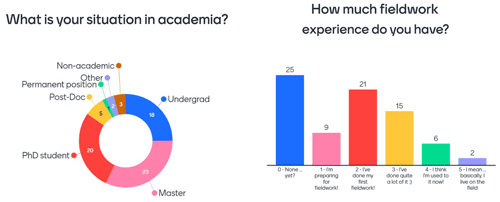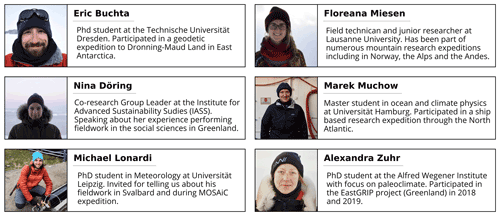the Creative Commons Attribution 4.0 License.
the Creative Commons Attribution 4.0 License.
Let's talk fieldwork: early-career scientists sharing practical knowledge about polar fieldwork
Luisa von Albedyll
Rey Mourot
Lena Nicola
- Article
(2245 KB) - Full-text XML
- BibTeX
- EndNote
Twice a year, during the equinoxes, when daytime and nighttime are equal all around the world, the Association of Polar Early Career Scientists (APECS) celebrates International Polar Week. During this week, APECS aims to raise awareness of polar and alpine regions with their people, research and stories. Over the last years, APECS Germany has contributed several events to support and celebrate International Polar Week. On the occasion of Polar Week in March 2021 and with the motto “let's talk fieldwork”, we hosted a special online polar fieldwork panel discussion, welcoming fellow researchers and interested students alike.
Conducting polar fieldwork is no easy feat. Many months or even years of preparations are necessary before actually setting off: discussing research questions, writing proposals, making logistical arrangements, and planning food, equipment, clothing and personnel – only to name a few aspects. Nevertheless, it is a fundamental part of numerous polar research projects as it enables collecting in situ observations and samples that will lay the foundation for answering major research questions. Undertaking fieldwork can be both exciting and intimidating, especially when going for the first time. What should I bring? What is it like to live with the same people for days or even several weeks on end? Am I going to be cold? Existing resources like the INTERACT Fieldwork Planning Handbook (Rasch et al., 2019) already present in-depth explanations relating to a wide range of topics. We, a team from APECS Germany, wanted to provide a more personal and informal environment for debating ideas, experiences, issues and other curious questions which might come up. To enable this exchange, we invited six fieldwork-proven early-career scientists to form the panel for the discussion. Figure 1 presents their varied background and fieldwork experience ranging from expeditions to mountain glaciers and continental ice sheets, to research cruises through the Arctic, to social and scientific studies in Greenland.
We started the event by introducing the panel and engaging the audience in some interactive polls. As shown in Fig. 2, our audience mostly consisted of undergraduates as well as PhD and Master's students with varying fieldwork experience. Subsequently, Luisa von Albedyll started moderating the discussion by channeling questions and thoughts laid out by over 140 participants – a high number for an APECS Germany event. Below, we present a summary snapshot of the discussion as it happened live.

Figure 2Meet our audience! Pooling results of the academic situation and fieldwork experience of the attendees. Poll and figure created using Mentimeter (https://www.mentimeter.com, last access: 19 August 2022).
Eric Buchta starts the discussion by relating his experiences and memorable moments during his fieldwork on the East Antarctic Ice Sheet. One aspect that stood out for him in particular was the absolute silence. With your colleagues and maybe some machinery as the only source of noise, the Antarctic Ice Sheet can be one of the quietest places on Earth. Aside from that he is also very excited about the special feeling of finally bringing home and working with his hard-earned research data. “Sometimes that is no easy feat!”, continues Michael Lonardi as he explains a chain of events during which one of his weather balloons deflated midair, damaging crucial research equipment. Fortunately, his story has a happy ending due to the extraordinary solidarity of his fellow expedition members, who helped in recovering and repairing his instruments. Mutual help like this is both an essential and heartwarming part of working together in these remote locations.
Working while temperatures reach deep into the negatives seems very demanding. How do you stay warm when doing fieldwork?
Working in polar regions requires appropriate clothing. It has to allow for free movement but also protection from environmental challenges and cold-related injuries. Besides having different layers of clothing, a hat, spare socks and of course well-fitting gloves, Floreana Miesen suggests taking a thermos containing hot water or tea as well as a small insulated sitting pad. “Having a hot drink during breaks helps staying warm.” And of course, no more cold bums while sitting in the snow!
Preparation is a substantial part of fieldwork. Could you tell us more about the process?
The extent and time span of fieldwork preparation depend on the study region and the scope of the project. In any case, it is a long way from the initial idea to the actual fieldwork. Most of our panelists relate to the effort of writing proposals, planning and testing instrumentation, arranging transportation and customs, preparing for natural hazards, and many other aspects. “It takes months of preparation until one finally ventures into the field”, everybody agrees. Also, there are major differences depending on the field of research. As a social scientist, Nina Döring spent a lengthy period of time in Greenland, engaging with people and studying administrative and political processes. Her preparation includes establishing contacts, building relationships and thoughtfully preparing for interviews. This is very different compared to preparing a geoscientific expedition!
Spending 7 d a week with the same small group of people seems stressful. How do you deal with that?
Alexandra Zuhr recounts her time at the EastGRIP camp on the Greenland Ice Sheet where she stayed in 2018 and 2019. Since one must share a lot of otherwise private space, spending weeks with the same group of people can be tiring indeed. “It is very important to find some time for yourself”, Alexandra Zuhr explains. Bringing a good book or headphones helps do just that. Another way of catching some peace is by getting up early while most people are still asleep.
Going on a field trip to the polar regions sounds very exciting! So, how can I create these opportunities for myself?
Conducting polar fieldwork is normally part of a dedicated research project with corresponding funding and employed personnel. But what about students and undergraduates? Taking part in a fieldwork project not only comes with a lot of motivation and excitement but may also provide real-world practical experiences in your research field. Marek Muchow, who participated in multiple ship-based expeditions as a student, explains that these fieldwork opportunities do not come by themselves. Often they are a product of a lot of personal engagement with the right people. “Be vocal about your desire to go on the field” he states. “You have to stay active and state your interest, especially if you are a student!”
After about 1 h filled with discussion and engagement, our panel concluded that polar fieldwork is highly enjoyable, but also entails a lot of effort. Free time is limited and there are no weekends off. In return, you may engage with people and their culture, carry out important observations, gather valuable samples and learn new skills – all whilst living and working in one of the Earth's most fascinating and remote regions.
Wrapping up the event, Lena Nicola presented a comprehensive summary of contact points, study programs, jobs and short-term courses enabling fieldwork opportunities. Interested? All resources are available on our website at https://apecs-germany.de (last access: 19 August 2022). Afterwards, everyone was invited to get to know the panelists in break-out groups and engage in more detailed discussions. Finally, we cannot let people leave without taking a group picture – everybody turn your camera on (Fig. 3)!
So how do we, as part of the organizing team, feel about this event? We are very pleased by both the active participation of our audience during the discussion and the positive feedback we received afterwards. Days after the event, participants were still posting and discussing their favorite fieldwork pictures and memories on social media. Polar fieldwork is a particularly fascinating topic, especially for early-career scientists. The format of a moderated panel discussion, even when done virtually, can capture this fascination very well. The positive feedback and the great interest of our participants showed us how important it is to create platforms like this for exchange among early-career scientists. APECS Germany is looking forward to continuing to engage with the polar community by supporting and hosting similar events in the future.
No data sets were used in this article.
EL drafted the paper for the report. LvA, RM and LN contributed to the writing process and the final version of the article.
The contact author has declared that none of the authors has any competing interests.
Publisher's note: Copernicus Publications remains neutral with regard to jurisdictional claims in published maps and institutional affiliations.
The authors would like to thank our panelists Eric Buchta, Nina Döring, Michael Lonardi, Floreana Miesen, Marek Muchow and Alexandra Zuhr for providing their time, energy and fieldwork experience, thereby enabling an interesting and lively discussion. We also thank Marek Muchow and Elisa Katharina Peter for their significant contribution to organizing the event. Finally, we thank the editor Donovan Denis and the anonymous reviewer for providing feedback that improved the quality and clarity of this article.
This paper was edited by Donovan Dennis and reviewed by one anonymous referee.
Rasch, M., Topp-Jørgensen, E., Fugmann, G., Hansen, F. S., Tummon, F., Schneider, A., Bull, J., Gremion, G., Roldan, G., Seag, M., and Hindshaw, R. V.: INTERACT Fieldwork Planning Handbook, DCE – Danish Centre for Environment and Energy, Aarhus University, Denmark, https://doi.org/10.25607/OBP-570, 2019. a
let’s talk fieldwork, APECS Germany hosted an online polar fieldwork panel discussion. Joined by a group of six early-career polar scientists and an audience of over 140 participants, the event provided an informal environment for debating experiences, issues and ideas. This contribution summarizes the event, sharing practical knowledge about polar fieldwork and fieldwork opportunities for early-career scientists.
let’s talk fieldwork, APECS...







